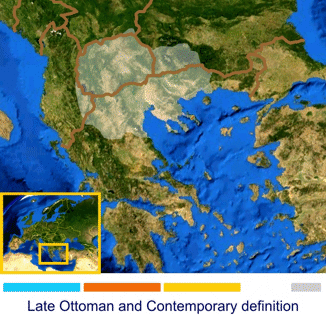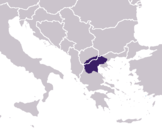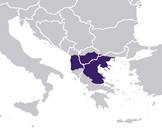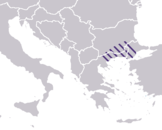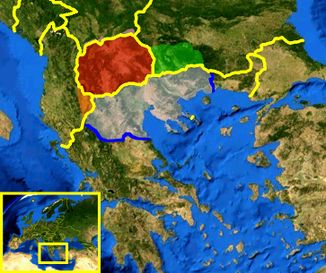مقدونيا (مصطلح)
| مقدونيا | |
| The contemporary geographical region of Macedonia is not officially defined by any international organisation or state. In some contexts it appears to span five current sovereign countries: Albania, Bulgaria, Greece, the Republic of Macedonia, and Serbia. For more details see the boundaries and definitions section in Macedonia (region). |
يستخدم اسم مقدونيا Macedonia في عدد من المعاني المختلفة لوصف مناطق جغرافية، سياسية وتاريخية، لغات وشعوب في الجزء الجنوبي الشرقي من أوروپا. أثار هذا المصطلح جدل سياسي كبير منذ أوائل القرن العشرين. الوضع معقد لأن هناك جماعات عرقية مختلفة تستخدم مصطلح مختلف لوصف نفس الكيان، أو نفس المصطلح يستخدم لوصف كيانات مختلفة، ذات دلالات سياسية مختلفة.
تاريخياً، مثل الاقليم تحول ملحوظ لحدود شبه جزيرة البلقان. جغرافياً، لا يوجد تعريف واحد لتلك الحدود أو أسماء لتقسيماتها، مقبولة من جميع الباحثين أو الجماعات العرقية. ديموغرافياً، فهذه المنطقة مأهولة بصفة رئيسية من أربع جماعات عرقية، ثلاث منها تعرف نفسها كمقدونية: إثنان بلغار وواحدة يونانية على المستوى الاقليمي، بينما الثالثة ذات عرقية مقدونية على المستوى الوطني. لغوياً، فأسماء اللغات واللهجات المستخدمة في الاقليم محل جدل. سياسياً، حقوق توسيع استخدام اسم مقدونيا ومشتقاته أدى إلى نزاع دبلوماسي بين اليونان وجمهورية مقدونيا. بالرغم من وساطة الأمم المتحدة، إلا أن النزاع لم يحسم بعد.
. . . . . . . . . . . . . . . . . . . . . . . . . . . . . . . . . . . . . . . . . . . . . . . . . . . . . . . . . . . . . . . . . . . . . . . . . . . . . . . . . . . . . . . . . . . . . . . . . . . . . . . . . . . . . . . . . . . . . . . . . . . . . . . . . . . . . . . . . . . . . . . . . . . . . . . . . . . . . . . . . . . . . . . .
التسمية
التاريخ
| مقدونيا التاريخية | |
| مقدونيا القديمة | الفترة الرومانية |
| [[Image:LocationMacedonia-OTT-2-z.png|center|162px|الفترة العثمانية: لم تكن مقدونيا جزءاً من الدولة العثمانية. | |
| المقاطعة البيزنطية (حدود تقريبية) |
الفترة العثمانية (تقريبية) |
| مقدونيا القديمة: Approximate borders of the kingdom before its major expansion, ح. 350 ق.م المقاطعة الرومانية (approximate borders of maximum extent). There was also a later diocese of Macedonia. مقاطعة بيزنطية: situated much further east than previous and later units (approximate borders). الفترة الدولة العثمانية: During the first four centuries of the Ottoman period, western scholars thought of Macedonia in terms of Greco-Roman geography. The Ottoman Empire did not have an وحدة إدارية by that name. In the early 19th century, the definition of Macedonia by most scholars, approximately matched the contemporary region, with occasional variations.[1] | |
منطقة تقع شمالي اليونان. أقام فيها اليونان الذين ينتمون إلى الفرع الدوري. وحكمها ملوك تعاقبوا حسب قاعدة ثابتة. عمل فيلبس الثاني (359-336) على جعلها القوّة العظمى في اليونان (1مك 6 :2). قبل حملات الاسكندر، شجّع المكدونيون الثورة على الحكم الفارسي. صارت مركز الملكية الهلنستية للانطيگونيين (خلفاء الاسكندر)، فقدّمت عددًا من الجنود للمملكة السلوقيّة (2مل 8 :20). احتلّها الرومان بعد أن هزموا فرساوس سنة 168 ق.م. (1مك 8 :5). تنظّمت مكدونية في أربع جمهوريات مستقلة. وفي سنة 146 صارت مقاطعة. من سنة 27 ق.م. إلى سنة 15 ب.م. صارت محافظة شيوخية. من سنة 15 إلى سنة 44 ارتبطت بالامبراطور. ثم أعادها كلوديوس إلى مجلس الشيوخ.
هي في الكتاب المقدس موطن الاسكندر الكبير وهامان (كما في النص اليوناني في اس (يو) 8 :22). لقد شارك 4000 مكدوني في الحرب على بابلونية (2مك 8 :20). هذه المقاطعة الرومانية (عاصمتها : تسالونيكي)، قد عرفها بولس خلال رحلته الرسولية الثانية وأسّس فيها كنائس ديناميكية (اع 16 :9-14؛ 18 :5؛ رج فل 4 :15). زارها خلال رحلته الرسوليّة الثالثة (اع 19 :21-22؛ 20 :1-6؛ رج 1كور 16 :5؛ 2كور 1 :16؛ 2 :13؛ 7 :15ي) ورحلته الرابعة (1تم 1 :3). شارك مسيحيو مكدونية مشاركة سخيّة في اللمة الكبيرة من أجل كنيسة اورشليم الفقيرة (رو 15 :26-27؛ 2كور 8 :1-15؛ 9 :1-4)، وفي حاجات بولس الشخصية (2كور 11 : 9). ملاحظة. قد تعني كتيم (1مك 1 :1؛ 8 :5) مكدونية. مدن مكدونية : رج امفيبوليس (اع 17 :1). ابولونية (اع 17 :1)، بيرية (اع 17 :10-14)، دوباريس (اع 20 :4 محل دربة في بعض المخطوطات)، نيابوليس (اع 16 :11)، فيلبي (اع 16 :12)، تسالونيكي (اع 17 :1-13). الملوك المذكورون : الاسكندر الكبير (1مك 6 :2)، فرساوس، فيلبس (1مك 8 :5). مكدونيون رافقوا بولس الرسول : ارسترخس (أع 19 :29)، گايوس (اع 19 :29). المقدوني او المكدوني. رج 1مك 1 :1؛ 6 :2؛ 2مك 8 :20؛ اع 16 :9؛ 19 :29).
التاريخ المبكر
مقدونيا القديمة
مقدونيا الرومانية
مقدونيا البيزنطية
مقدونيا العثمانية
[[ملف:ماكدونيا - الأرشيف العثماني 1906.jpg|350px|تصغير|يسار|مقدونيا، من الأرشيف العثماني، 1906.]]
التاريخ المعاصر
الجغرافيا
الأقاليم الفرعية
| مقدونيا الجغرافية | |
|
أقاليم فرعية كبرى: | |
|
مناطق صغرى: |
. . . . . . . . . . . . . . . . . . . . . . . . . . . . . . . . . . . . . . . . . . . . . . . . . . . . . . . . . . . . . . . . . . . . . . . . . . . . . . . . . . . . . . . . . . . . . . . . . . . . . . . . . . . . . . . . . . . . . . . . . . . . . . . . . . . . . . . . . . . . . . . . . . . . . . . . . . . . . . . . . . . . . . . .
الأقاليم الكبرى
الأقاليم الصغرى
الديموغرافيا
| الديموغرافيا المقدونية | |
| مقدونيون ح. 5 مليون |
All inhabitants of the region, irrespective of ethnicity |
| مقدونيونN-[3] ح. 1.3 مليون بالإضافة للشتات |
An ethnic group, more rarely referred to as Macedonian Slavs[2] or Slavomacedonians (used mostly by Greek authorities to refer to the ethnic Macedonian minority in Greece[3])N-[5] |
| مقدونيونN-[3] ح. 2.0 مليون |
Citizens of the Republic of Macedonia irrespective of ethnicity |
| مقدونيون ح. 2.6 مليون بالإضافة للشتات |
An ethnic Greek regional group, also referred to as Greek Macedonians |
| المقدونيون (عدد السكان غير معروف) |
A group of antiquity, also referred to as Ancient Macedonians. |
| مقدونيون ح. 0.3 مليون |
A Bulgarian regional group,[4] also referred to as Piriners. |
| مقدونيون-رومانيون ح. 0.3 مليون |
An alternative name for Aromanians |
اللغات
| لغات مقدونيا | |
| المقدونيةN-[3] | A contemporary Slavic language, also referred to as Slavomacedonian or Macedonian Slavic[5] N-[5] |
| المقدونية | A dialect of Modern Greek, typically simply referred to as Greek, since its differences with the Greek spoken in the rest of Greece are only a few words, phrases and some features of the pronunciation. |
| المقدونية | A language or dialect of antiquity, possibly a dialect of ancient Greek |
| المقدو-رومانية | Another name for the Aromanian language |
السياسة
القومية العرقية المقدونية
القومية اليونانية
التسمية في لغات الاقليم
مقدونياا
| بالألبنية: | [Maqedonia] Error: {{Lang}}: text has italic markup (help) | باليونانية: | [Μακεδονία] Error: {{Lang}}: text has italic markup (help) (Makedonia) | بالصربية: | [Македонија] Error: {{Lang}}: text has italic markup (help), [Makedonija] Error: {{Lang}}: text has italic markup (help) | ||
| بالأرمنية: | [Մակեդոնիա] Error: {{Lang}}: text has italic markup (help) (Makedonia) | اللاديونية: | [Makedonia] Error: {{Lang}}: text has italic markup (help), מקדוניה | بالصربية (archaic): | [Маћедонија] Error: {{Lang}}: text has italic markup (help), [Maćedonija] Error: {{Lang}}: text has italic markup (help) | ||
| بالأرومانية: | [Machidunia/Machedonia] Error: {{Lang}}: text has italic markup (help) | بالمقدونية: | [Македонија] Error: {{Lang}}: text has italic markup (help) (Makedonija) | بالتركية: | [Makedonya] Error: {{Lang}}: text has italic markup (help) | ||
| بالبلغارية: | [Македония] Error: {{Lang}}: text has italic markup (help) (Makedoniya) | بالرومية: | [Makedoniya] Error: {{Lang}}: text has italic markup (help) |
المصطلح حسب الجماعة العرقية
الهوامش
n-[1] a b c During the Greek Civil War, in 1947, the Greek Ministry of Press and Information published a book, I Enandion tis Ellados Epivoulis ("Designs on Greece"), namely of documents and speeches on the ongoing Macedonian issue, many translations from Yugoslav officials. It reports Josip Broz Tito using the term "Aegean Macedonia" on the October 11, 1945 in the build up to the Greek Civil War; the original document is archived in 'GFM A/24581/G2/1945'. For Athens, the "new term, Aegean Macedonia", (also "Pirin Macedonia"), was introduced by Yugoslavs. Contextually, this observation indicates this was part of the Yugoslav offensive against Greece, laying claim to Greek Macedonia, but Athens does not take issue with the term itself. The 1945 date concurs with Bulgarian sources. Further information on this can be found in the article Aegean Macedonia.
n-[2] a b Despite a history of use by Bulgarian nationalists,[6] the term "Pirin Macedonia" is today regarded as offensive by certain Bulgarians,[7] who assert that it is widely used by Macedonists as part of the irredentist concept of United Macedonia. However, many people in the country also think of the name as a purely geographical term, which it has historically been. Its use is, thus, controversial.
n-[3] a b c d e f g The constitutional name of the country "Republic of Macedonia" and the short name "Macedonia" when referring to the country, can be considered offensive by most Greeks, especially inhabitants of the Greek province of Macedonia. The official reasons for this, as described by the Greek Ministry of Foreign Affairs, are:
"The choice of the name Macedonia by FYROM directly raises the issue of usurpation of the cultural heritage of a neighbouring country. The name constitutes the basis for staking an exclusive rights claim over the entire geographical area of Macedonia. More specifically, to call only the Slavo-Macedonians Macedonians monopolizes the name for the Slavo-Macedonians and creates semiological confusion, whilst violating the human rights and the right to self-determination of Greek Macedonians. The use of the name by FYROM alone may also create problems in the trade area, and subsequently become a potential springboard for distorting reality, and a basis for activities far removed from the standards set by the European Union and more specifically the clause on good neighbourly relations. The best example of this is to be seen in the content of school textbooks in the Former Yugoslav Republic of Macedonia."[8]
n-[4]^ The abbreviated term "FYROM" can be considered offensive when used to refer to the Republic of Macedonia. The spellout of the term, the "former Yugoslav Republic of Macedonia", is not necessarily considered offensive, but some ethnic Macedonians may still find it offensive due to their right of self-identification being ignored. The term can also be offensive for Greeks under certain contexts, since it contains the word Macedonia.
n-[5] a b c d Although acceptable in the past, current use of the name "Slavomacedonian" in reference to both the ethnic group and the language can be considered pejorative and offensive by ethnic Macedonians living in Greece. The Greek Helsinki Monitor reports:
"...the term Slavomacedonian was introduced and was accepted by the community itself, which at the time had a much more widespread non-Greek Macedonian ethnic consciousness. Unfortunately, according to members of the community, this term was later used by the Greek authorities in a pejorative, discriminatory way; hence the reluctance if not hostility of modern-day Macedonians of Greece (i.e. people with a Macedonian national identity) to accept it."[9]
. . . . . . . . . . . . . . . . . . . . . . . . . . . . . . . . . . . . . . . . . . . . . . . . . . . . . . . . . . . . . . . . . . . . . . . . . . . . . . . . . . . . . . . . . . . . . . . . . . . . . . . . . . . . . . . . . . . . . . . . . . . . . . . . . . . . . . . . . . . . . . . . . . . . . . . . . . . . . . . . . . . . . . . .
الهوامش
- ^ Wilkinson, H.R. (1951). Maps and Politics; a review of the ethnographic cartography of Macedonia. Liverpool: Liverpool University Press. pp. (a) p. 1, (b) pp. 2–4, 99, 121 ff., (c) p. 120, (d) pp. 4, 99, 137, (e) pp. 2, 4. قالب:LCC.
- ^ Frucht, Richard C. (2008). "History". [0-199-23768-9 Eastern Europe]. ABC–CLIO. p. 595. ISBN 1-57607-800-0.
{{cite book}}: Check|url=value (help)
* Livanios, Dimitrios (2008). "Introduction". [0-199-23768-9 The Macedonian Question]. Oxford University Press. p. 23. ISBN 0-7453-1589-5.{{cite book}}: Check|url=value (help) - ^ Cowan, Jane K. (2000). Macedonia. Pluto Press. pp. xiv–xv. ISBN 0-7453-1589-5.
- ^ "Macedonians of Bulgaria". British Council — Bulgaria. Retrieved 11 September 2006.
- ^ "Report for Macedonian language". Ethnologue. Retrieved 10 September 2006.
* Poulton, Who Are the Macedonians?, p. ix.
* "The Linguist List". Eastern Michigan University. Retrieved 10 September 2006. - ^ (بلغارية) "VMRO-BND (Bulgarian National Party)". Archived from the original on September 28, 2007. Retrieved July 21, 2006.
{{cite web}}: Unknown parameter|deadurl=ignored (|url-status=suggested) (help) - ^ (بلغارية) "Club for Fundamental Initiatives". КАК СТАВАХ НАЦИОНАЛИСТ. Retrieved July 21, 2006.
- ^ "Hellenic Republic, Ministry of Foreign Affairs". Former Yugoslav Republic of Macedonia (FYROM) — The Name Issue. Retrieved July 17, 2006.
- ^ خطأ استشهاد: وسم
<ref>غير صحيح؛ لا نص تم توفيره للمراجع المسماةslavomacedonian
مراجع أساسية
- Borza, Eugene N. (1999). Before Alexander: constructing early Macedonia. Claremont, CA: Regina Books. ISBN 0-941690-97-0. (pb)
- Danforth, Loring M. (1995), The Macedonian Conflict: ethnic nationalism in a transnational world Princeton, NJ: Princeton University Press. ISBN 0-691-04357-4
- Fox, Robin Lane (1973). Alexander the Great. Penguin Books. ISBN 0-14-008878-4. (pb)
- Wilkinson, Henry Robert (1951). Maps and politics; a review of the ethnographic cartography of Macedonia. Liverpool: Liverpool University Press.
- CS1 errors: URL
- CS1 errors: unsupported parameter
- Articles with hatnote templates targeting a nonexistent page
- Lang and lang-xx template errors
- Articles containing Greek-language text
- Articles containing أرمنية-language text
- Articles containing مقدونية-language text
- Articles containing بلغارية-language text
- مقالات مميزة
- مقدونيا
- مصطلحات جغرافية
- جدل متعلق بالثقافة
- جدل تاريخي
